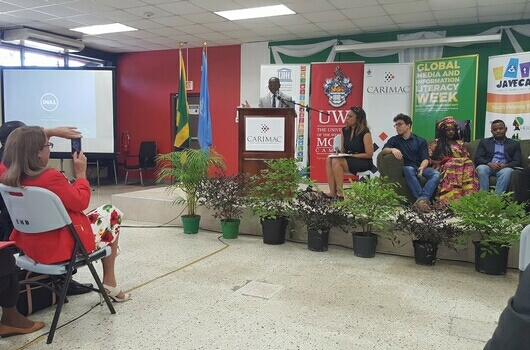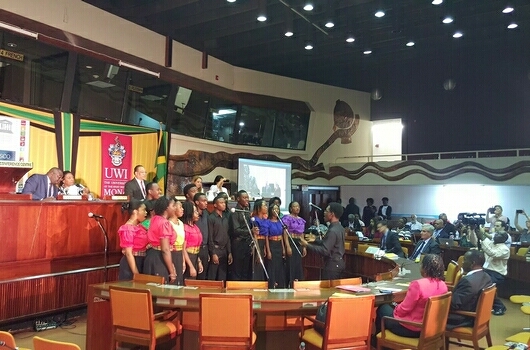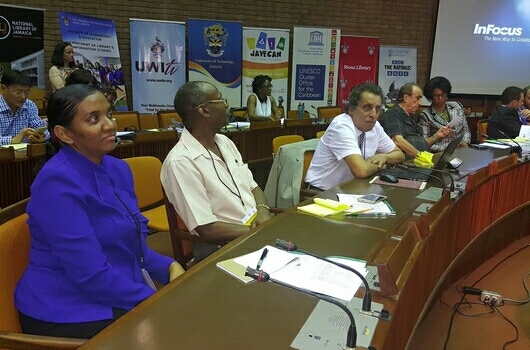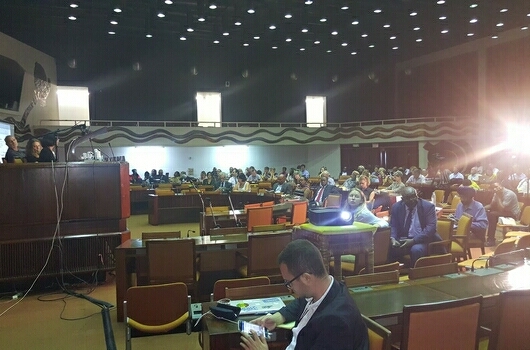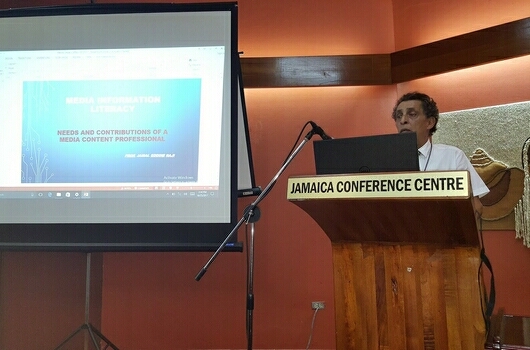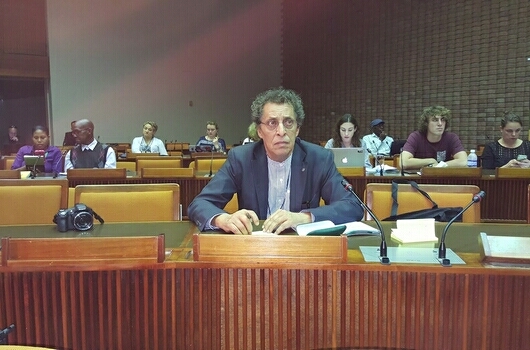UNESCO launches “The International Media and Information Literacy Charter” in Jamaica
UNESCO organized the 7th conference on Media and Information Literacy (MIL) as part of the “Global Media and Information Literacy Week” held in Kingston from October 24th to November 1st. This conference, that have witnessed the participation of more than 80 countries, gave special attention to the Global MIL Week Youth Agenda Forum, a pre-conference which took place on October 24th, 2017, at the University of the West Indies, Mona Campus, Jamaica.
This annual global MIL conference, in which Mr. Jamal Eddine Naji represented the High Authority for Audiovisual Communication (HACA), was held under the theme “Media and Information Literacy in Critical Times: Reimagining Ways of Learning and Information Environments”, and is the seventh of its kind since 2011. During the first annual conference that was organized in Sidi Mohammed Ben Abdellah University of Fez, more than twenty universities called for the annual organization of this event as part of the International Network of Universities linking MIL to intercultural dialogue, which was created to strengthen intercultural and cooperative research on MIL and to encourage inter-regional MIL initiatives on topics such as cultural diversity, intercultural and inter-religious dialogue, inclusion and peace-building. After Fez, this broad alliance was held in Barcelona (2012), Cairo (2013), Beijing (2014), Philadelphia (2015) and Sao Paulo (2016).
These annual weeks include around 600 organizations from a variety of academic, professional, industrial and civil society backgrounds… and bring together as well a great alliance: the Global Alliance for Partnerships on MIL (GAPMIL), allied to the " United Nations Alliance of Civilizations (UNAOC)".
The participants in the three days conference at Kingston, that was regarded as a reference and an aggregator of the events and actions related to MIL around the world to boost MIL connections between disciplines, professions, besides education and information environment, particularly stressed on the question of forging capacities amongst media users, youth and children first, professionals, educators, as well as ordinary citizens and consumers of media content: To understand and manage one’s rights online; to combat online incitement to hatred and cyberbullying; understand communication ethical issues; engage, via media and ICTs, in promoting equality, freedom of expression, tolerance, intercultural / interreligious dialogue, peace, etc.
In his intervention as a panelist, Mr. Jamal Eddine Naji chose to question and list "the needs and contributions of media content professionals" in relation with their - supposedly natural - involvement in MIL. He thus reviewed, through a series of questions and observations, particularly in Africa and in the countries of the South in general: the postures and roles of media professionals: their awareness regarding the risks endangering, via media, the general rights of children and youth; the prerequisites of their training (basic and ongoing) and professional skills in this respect ... Before attempting to demarcate, while taking into account the contexts of the countries and media, the areas of intervention and the responsibilities of professionals, media decision-makers, citizens, and political decision-makers…. Mr. Naji concluded on the need to build solid and substantial partnerships for support and assistance, similar to the one binding HACA with operators and professionals in Morocco, in order to develop media support tools, sensitize and train professionals, develop didactic tools or assistance for research, or the conception of a content in line with MIL recommendations etc.
Moreover, given the broad panorama of the interventions, workshops and debates of these three days conference, notably the significant participation of some major school and public libraries’ organizations, one could retain that the ultimate goal for educators is to establish ties between training inside and outside the classroom and to transform education into a vector of social change that promotes respect for human rights online and offline, and construct a new identity for citizenship which is based on a critical civil participation and intercultural dialogue, in order to face the difficulties engendered by the post-truth era, and obstacles such as misinformation, fake news, sensationalism, conflicting information etc.
It is at this level of demand or challenge that UNESCO launched a popular campaign named “MIL CLICKS 1” (Critical thinking, Creativity, Literacy, Citizenship, Knowledge, and Sustainability). MIL CLICKS is an approach to ameliorate critical analysis skills online and offline. It will be the founding core of an initiative on social media networks about some non-traditional, creative or innovative ways to acquire MIL skills and intercultural dialogue to use in everyday life, for all types of media and information environments. Therefore, every person and organization can add to MIL CLISKCS (https://en.unesco.org/MILCLICKS).
In addition to this dynamic space in the universe of social media, UNESCO has launched "MIL MOOC", a free, global, and polyglot training space on MIL titled: "Media & Information Literacy Massive Online"
(http://milmooc.aub.edu.lb/?lang=ar; http://milmooc.aub.edu.lb/?lang=en), in addition to a space dedicated to the training of educators: "Online Multimedia Mil Teaching Resources Tool":
http://unesco.mil-for-teachers.unaoc.org/?lang=ar;http://unesco.mil-for-teachers.unaoc.org/?lang=en).
At last, all these initiatives, that pursue the widest possible mobilization of all energies for MIL, must be framed, according to UNESCO’s officials, by a commitment charter titled: “MIL Clicks’ Pact: Think Critically and click Wisely", which HACA converted to a polyglot text immediately, at the request of UNESCO (represented by Mr. Alton Grizzle Program Specialist, UNESCO Headquarters, Paris - Manager for UNESCO's Global Actions on Media and Information Literacy) in Arabic, Amazigh, French and Spanish.
Download the other versions : Arabe, amazigh, français, espagnol et anglais.
![]()
![]()
https://en.unesco.org/MILCLICKS
![]()

